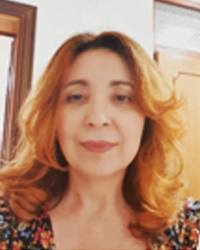 Felicia Carotenuto
Felicia Carotenuto
Università di Roma Tor Vergata School of Medicine, Italy
Dr Felicia Carotenuto received Master’s degree in “Biological Sciences” and Master’s degree in “Natural Sciences” with honours from the University of Naples “Federico II” and subsequently the Ph.D. in “Experimental Pathophysiology” from the University of Rome “Tor Vergata” where she had a postdoctoral position for several years. Over the years she has developed extensive experience in the field of cell biology, material science and innovative biomedical applications. Currently she is coordinator of Research Support at“Clinical Sciences and Translational MedicineDepartment”, Tor Vergata University,where she carrying out experimental research and teaching activity.Her scientific interest has been mainly focused on the study of the therapeutic potential of bioactive compounds on experimental models of degenerative diseases and the study of new therapeutic approaches in the field of regenerative medicine and tissue engineering.She is author of several publications on international scientific journals.
*********************
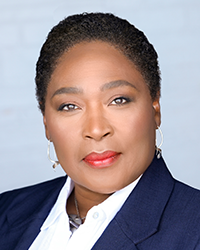 Desiree Cox
Desiree Cox
The HEALinc, USA
Dr. Desirée Cox, MD, MPhil, PhD CEO and Founder, The HEALinc Affiliate Faculty Member, Rutgers University, New Jersey, USA Chair of the Joint National Stem Cell Ethics Committee (NSCEC) and National Medical Ethics Committee of The Bahamas
Dr. Desirée Cox, MD, MPhil, PhD is a Rhodes Scholar, medical doctor, creative artist, and internationally respected thought leader in future health and regenerative medicine. Educated at McGill University (Canada), Oxford University (UK) and Cambridge University (UK), Dr. Desirée is the Founder and CEO of The HEALinc and The HEALinc Future Health Innovation Summit (www.healincsummit.com). She is also the CEO of ArtRegen, CEO of the Biotech R&D company BioPep and an Affiliate member of Rutgers University, Graduates Studies Faculty, New Jersey, USA. She is the first Rhodes Scholar from The Bahamas and the first woman Rhodes Scholar from the British Caribbean. She lives in the USA and The Bahamas.
As an innovator, her career in the UK, Europe, North America, The Bahamas, and Latin America has spanned clinical medicine, academia, research and development, regulatory sciences, and the design, development, and implementation of high–impact health and social enterprises. Dr. Cox is a thought leader in future health innovation with 20+ years in the healthcare space and an impressive, rare and unique range of skills and capacities integrating the sciences and the arts. Her experience in healthcare consulting includes consulting for biotech companies and major pharmaceutical companies, including Amgen, GSK and Novartis, on pipeline therapeutic products and medical devices.
In October 2017, she was honored by Oxford University as one of six alumni to have their portrait hung in the Great Hall at Pembroke College. She was one of 5 recipients of the 2019 International Advocacy Action Award at the World Stem Cell Summit in Miami, Florida. She was also a presenter at the 2018 Vatican ‘Unite to Cure’ Conference.
Since 2014, she has been spearheading the development of a regulatory system and ecosystem in The Bahamas for accelerated patient access to stem cell, regenerative medicine and other future health technologies manufactured in the US and Europe, Latin America and Asia. At the 40th Independence Celebrations in 2013, the Bahamas Government honored Dr. Cox by issuing a 70-cent stamp into circulation bearing her photograph.
*********************
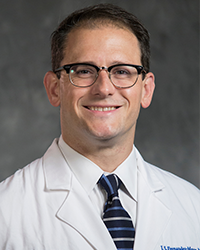 Joseph S. Fernandez-Moure
Joseph S. Fernandez-Moure
M.D., Duke University Medical Center, USA
Joseph S. Fernandez-Moure, MD, MS, FACS, is a renowned surgeon-scientist and leader in translational science. With a medical degree and a Master of Science in translational science, he bridges the gap between laboratory discoveries and clinical application. Dr. Fernandez-Moure's research focuses on developing innovative biomaterials for regenerative medicine and surgical techniques. His contributions have resulted in numerous publications and presentations at prestigious conferences, solidifying his reputation as a thought leader. A dedicated mentor, he actively trains and guides aspiring scientists and healthcare professionals. Dr. Fernandez-Moure's commitment to diversity and inclusivity is evident in his advocacy efforts within the scientific community. His exceptional academic and professional achievements, combined with his dedication to advancing translational science, position him as a prominent figure shaping the future of medicine.
Joseph S. Fernandez-Moure MD MS FACS
Assistant Professor
Department of Surgery
Division of Trauma, Acute and Critical Care Surgery
Duke University Medical Center
DUMC 2837
2301 Erwin Road
Durham, NC 27710
*********************
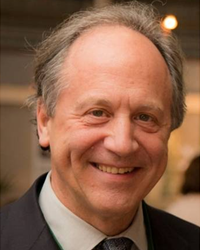 Pere Gascon
Pere Gascon
M.D., Ph.D., University of Barcelona Medical School, Spain
Prof. Pere Gascon holds the position of Director, of the Lab. of Molecular and Translational Oncology and, Director of the Chair for Oncology and Multidisciplinary Knowledge, Univ. of Barcelona. He is board-certified (USA) in Internal Medicine, Hematology and Medical Oncology. He received his training at New York University Medical Center, the National Institutes of Health-HLBI, (Bethesda), and Washington University (St. Louis). From 1985 to 1999 he was the Director of the Division of Hematology-Oncology at Rutgers University-New Jersey Medical School achieving the highest academic degree of full Professor with tenure. In 1995 he received the Laureate Award by the American College of Physicians. In 1997 he was nominated Member of the NIH, NHLBI Hematology II Study Section. In 1998 he was selected among The Best Doctors in America. After 25 years at the United States, Dr. Gascon returned to Barcelona to become the Director of Medical Oncology-Hospital Clinic, and Professor of the Barcelona Medical School, position he held up to June 2019 respectively. His laboratory moved to the Grup Noves Estratègies en Càncer (NEC), Departament de Bioquímica i Biomedicina Molecular, Facultat de Biologia - Universitat de Barcelona. He has directed 27 PhD Thesis. He has published more than 260 peer review-papers. His IF is of 1.544, with 12,089 citations and a h-index of 48. He is member of the Alfa-Omega-Alfa Honour Society, fellow of the American College of Physicians, the NY Academy of Medicine, member of the NY Academy of Sciences, member of the Royal Academy of Medicine of Catalonia, member of the Royal Academy of Doctors of Europe and, member of the Royal College of Physicians of Edinburg, Scotland (UK). He is past president of the Academy of Sciences/Oncology of Catalonia. In 2009, he was a Founding Member of the ECO (Excellence in Oncology Quality Care) Foundation, Patron and Vice-President for Internationmal Affairs. From 2015 to 2023, he was the Editor--in-Chief, Journal of Clinical and Traslational Oncology. In 2017, he co-founded the Hippocratic Movement Association. His main research interests are in the role of the Nerve System in tumor progression: neuropeptides/neurotransmitters and tumor microenvironment. His main clinical interests are in breast and colorectal cancer, cytopenias and in supportive care.
*********************
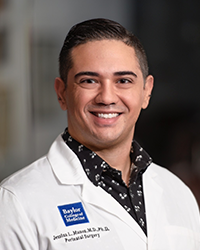 Jessian Munoz
Jessian Munoz
MD, Ph.D. Baylor University, Houston, USA
Dr. Muñoz received his Bachelor of Science from the University of Puerto Rico. He then attended Rutgers-New Jersey Medical School, graduating in 2013 with a dual major Ph.D. in Stem Cell Biology and Neuroscience followed by completion of his M.D. in 2015. He went on to complete residency training in Obstetrics and Gynecology at the Cleveland Clinic Foundation in 2019 and an MPH in Health Policy Analysis in 2020. Dr. Muñoz completed a fellowship in Maternal Fetal Medicine at the University of Texas Health San Antonio in 2022. He then joined Texas Children’s Hospital’s Fetal Surgery program. His research has focused on the evidence-based management and translational biomarker development for Placenta Accreta Spectrum disorders. This work was recently awarded the 2022 SMFM Excellence in Research award. His multidisciplinary projects aim to reduce blood transfusion on Labor and Delivery have subsequently reduced severe maternal morbidity for all pregnant patients.
*********************
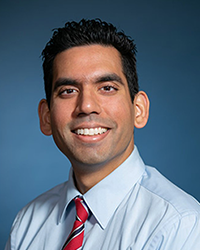 Shyam A. Patel
Shyam A. Patel
M.D., Ph.D. UMass Memorial Medical Center, USA
Dr. Shyam A. Patel attended Rutgers – New Jersey Medical School from 2006-2013 where he completed the physician-scientist training program (PSTP). His thesis focused on the mechanisms of breast cancer resistance to chemotherapy and breast cancer dormancy in the bone marrow. He worked in the laboratory of Dr. Pranela Rameshwar. He then completed Internal Medicine residency and Hematology/Oncology fellowship at Stanford University. His post-doctoral research focused on the leukemic stem cell niche in acute myeloid leukemia. He worked in the laboratory of Dr. Ravindra Majeti.
He is currently Assistant Professor of Medicine at UMass Chan Medical School and studies myeloid malignancies. His current research focuses on clinic-genomic profiling and clonal dynamic modeling of myelodysplastic syndrome and acute myeloid leukemia (Patel SA et al., Leuk Lymphoma 2021; 62: 3348-60). He strives to deliver precision medicine to all of his patients with blood cancers.
*********************
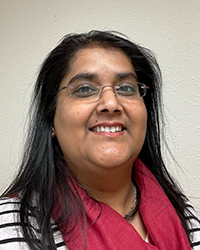 Mayuri Prasad
Mayuri Prasad
Labcorp Drug Development, USA
Dr Mayuri Prasad, PhD, Aalborg University, Denmark Post Doctoral Fellow and Internal Study Director, Labcorp Early Development Madison- Dr Prasad has been working in the Cell & Gene Therapy Safety Assessment team to facilitate the setup and validation of a new, state of the art BSL2 facility in Labcorp Early Development Madison, Wisconsin. She is responsible for investigating key questions in this field of research, and to showcase Labcorp’s scientific and technical capabilities, share vital information with clients to help design better study protocols and answer crucial questions relevant for preclinical studies within Cell and Gene therapy.
Dr Prasad also has extensive experience the field of Breast and Ovarian Cancer research, making headways in characterizing breast epithelial cells from normal women of various genetic ancestry, establishing novel feeder-free culture method for primary epithelial cells and determining how collection and processing of tumor tissues under physioxia and ambient air affect Cancer Stem Cell (CSC) characteristics, cellular signaling networks, and sensitivity to therapies. Additionally, she worked on identifying novel CSC marker in High Grade Serous Ovarian Cancer and developed knockout ovarian cancer cell line models.
*********************
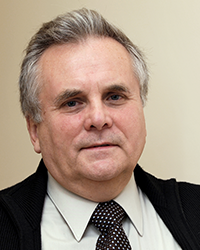 Mariusz Z. Ratajczak
Mariusz Z. Ratajczak
University of Louisville, USA
Dr. Ratajczak is the Henry M. and Stella M. Hoenig Endowed Chair in Cancer Biology and the Director of the Developmental Biology Research Program at the University of Louisville's James Graham Brown Cancer Center and Professor at Warsaw Medical University, Poland. He is an internationally known specialist in the field of adult stem cell biology. His 2005 discovery of embryonic-like stem cells in adult bone marrow tissues has the potential to revolutionize the field of regenerative medicine. Among Dr. Ratajczak’s prestigious awards are the 2014 Life Achievement Karl Landsteiner Award from German Society for Transfusion Medicine and Immunohematotherapy, 2008 President’s Award for Outstanding Scholarship, Research and Creativity from the University of Louisville, the 2008 Cancer Researcher of the Year award, the 2006 Award in Medicine and Biology from the Foundation for Polish Sciences (the highest scientific award in Poland). He is editor-in-chief of the Journal of Cancer Stem Cell Research and Central European Journal of Biology and section editor for the journal Leukemia. He has published numerous books and more than 400 peer-reviewed publications and is a frequent speaker at conferences worldwide. His work is currently supported by two R.01 grants from National Institutes of Health.
*********************
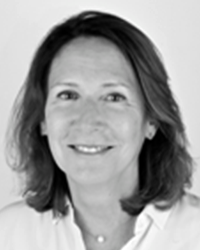 Veronique Santran
Veronique Santran
Icelltis, Toulouse, France
R&D manager and Business Developer. Products : cells, organoids for research use.
*********************
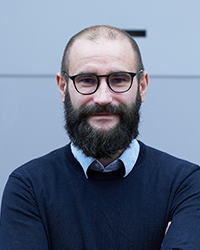 Patrick Steglich
Patrick Steglich
Technische Hochschule Wildau, University of Applied Sciences, Germany
Patrick Steglich received the Ph.D. degree in industrial engineering from the Università degli Studi di Roma Tor Vergata, Rome, Italy, with a focus on integrated photonics for communication and sensing, in 2017. In 2023, he received the habilitation degree from Brandenburg University of Technology Cottbus–Senftenberg for his work on silicon-organic hybrid photonics. He was a research scientist at IHP—Leibniz-Institut für innovative Mikroelektronik, Frankfurt (Oder), Germany, and also a Lecturer of Photonics and Optical Technologies with the Technische Hochschule Wildau. His current research is focused on chip-integrated biosensors for point-of-care applications. He co-founded HyPhoX to commercialize silicon photonic integrated biosensors for real-time and label-free analysis of proteins, virus or pathogens in blood, urine, saliva or water.
*********************
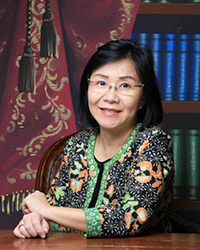 Septelia Inawati Wanandi
Septelia Inawati Wanandi
Universitas Indonesia, Indonesia
Septelia Inawati Wanandi is a Professor in the Department of Biochemistry and Molecular Biology, Faculty of Medicine Universitas Indonesia (FMUI), where she has been a lecture since 1988. She has pursued the MD degree at FMUI in 1981-1987, and the Dr.rer.physiol. degree at the Philipps University of Marburg, Germany in 1991-1994. From 1998 to 1999, she took the Post-Doctoral Program in the Department of Biochemistry and Molecular Biology, Faculty of Medicine Hokkaido University, Japan. She serves as the Head of Master’s Program in Biomedical Sciences FMUI since 2015. Between 2018 and 2021, she was appointed Head of Indonesian Consortium of Biomedical Sciences. She is a member of Medical Research Ethics Committee, Dharmais National Cancer Hospital Jakarta since 2018, and a member of National Committee of Stem Cell Services since 2021. From 2017 until now, she serves as the Head of Molecular Biology and Proteomics Core Facility in the Indonesian Medical Education and Research FMUI. Her research interests are oxidative stress and hypoxia, cancer and cancer stem cells and cellular senescence, in which she has published numerous international scientific article, patents, and intellectual properties
*********************
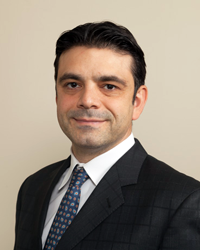 Murat Guvendiren
Murat Guvendiren
NJIT, USA
Murat Guvendiren is an associate professor and director of the materials engineering program in the Chemical and Materials Engineering Department at NJIT. He holds a secondary appointment in the Bioengineering Department at NJIT. His research focuses on developing cell-instructive biomaterials for 3D printing of tissues and organs. He received his PhD degree in Materials Science and Engineering from Northwestern University. He did postdoctoral research in the Materials Science and Engineering Department and Bioengineering Department at the University of Pennsylvania. Dr. Guvendiren is the recipient of NSF CAREER award (2021-2026), NJIT Excellence in Research award (2022), NCE Rising Star Research award (2022), NJIT Excellence in Innovative Teaching award (2021), NJIT Innovation in Engineering Education award (2020), and MTF Biologics Junior Investigator award (2019). He is an elected Senior Member of the National Academy of Inventors (NAI) since 2022.
*********************
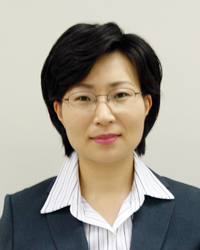 Mi-Sook Chang,
Mi-Sook Chang,
DDM, Ph.D., Seoul National University School of Dentistry, South Korea
Mi-Sook Chang, Ph.D., is a professor at Seoul National University's School of Dentistry and Dental Research Institute. Education: Ph.D. in Molecular Genetics and Biochemistry, University of Pittsburgh, USA; D.D.S. in Dentistry, Seoul National University, Korea; Pre-Dentistry Course, Korea. Prof. Chang has held various positions in academia, including professor at Seoul National University, chair of the Department of Oral Anatomy, assistant professor, and instructor. She has also held postdoctoral fellowships at New York University, Columbia University, Harvard Medical School, and University of Pittsburgh.
*********************
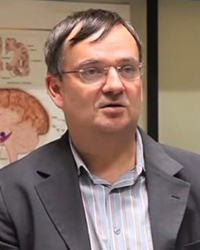 Henning Ulrich
Henning Ulrich
Biochemistry, University of São Paulo, Brazil
Prof. Henning Ulrich studied biology at the University of Hamburg and Kiel, Germany. He holds a PhD. in Biochemistry and Neuroscience of the University of Hamburg. He completed his training by postdoctoral research at the Center of Molecular Neurobiology at the University of Hamburg, Cornell University and the Institute of Chemistry at the University of São Paulo, Brazil. He is Full Professor and Head of the Laboratory of Neuroscience at the Institute of Chemistry of the University of São Paulo. He is a pioneer in the investigation of purinergic and bradykinin signaling in neurogenesis and neurodegeneration. He is a founding member of the Brazilian Purine Club (Brazilian Society of Purinergic Signaling), Vice-President (2010-2012) and President (2012-2018 and 2021-2024) of the society and has chaired many congresses of the Brazilian Purine Club. He has published more than 250 peer-reviewed manuscripts (ca. 10,000 citations, H: factor: 50).
*********************
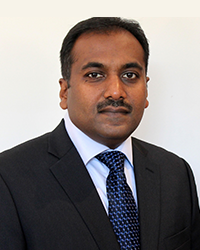 NIRMAL ROBINSON
NIRMAL ROBINSON
Australia
Dr Nirmal Robinson received his Ph.D in 2007 from the University of Bonn, Germany before conducting his postdoctoral research at the National Research Council of Canada, Ottawa. During this time, he deciphered the role of type-I interferons in regulating necroptotic cell death. He received the DFG-CECAD Fellowship in 2012 and joined as an independent Group Leader at the CECAD Research Centre at the University of Cologne. His research interests lie in understanding the molecular mechanisms that link metabolism and cellular stress responses in cancer and inflammation. Since the beginning of 2018 he is leading the Cellular Stress and Immune Signalling Lab at the Centre for Cancer Biology, University of South Australia and holds an adjunct position with The Adelaide University. He publishes extensively in influential journals and is regularly invited to present nationally and internationally. He actively contributes as a peer reviewer to a number of journals, international grants and serves on the editorial board of Cell Death and Disease.
*********************
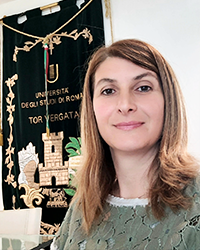 Federica Trovalusci, PhD
Federica Trovalusci, PhD
University of Rome “Tor Vergata”, Italy
PhD in Materials Engineering, Associate Professor of Manufacturing Technology and Systems at the Dept. of Enterprise Engineering Mario Lucertini. Director of “Scuola di Istruzione a Distanza, Scuola IaD” e-Learning Centre of the University of Rome “Tor Vergata”. Board member of AITEM - Manufacturing Italian Association. The main topics of her research: Additive Manufacturing, Finishing processes, High performance coatings, Laser processes, processes for polymers and composite materials. She actively participates in several national and international research projects. She cooperates with other Research Institutions and leading companies of the medical, automotive, and aerospace industries.
*********************
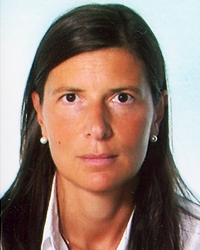 Elisabetta Ceretti
Elisabetta Ceretti
University of Brescia, Italy
Full Professor in Manufacturing at the University of Brescia since 2010. Since November 1993 to October 2001 she was Researcher at the University of Brescia and from 2001 to 2010 she was Assistant Professorat the same University. During her carrier she covered different roles inside the academic organization, especially in the organization and improvement of the education; she is Vice director of the DIMI form 1-11-20. Elisabetta Ceretti’s scientific activity was mainly focused on the study of innovative manufacturing processes optimizing the process by means of experimental tests and FE simulations, on the study of cutting and ultra precision machining processes considering the aspects of online tool monitoring, analysis of tool wear and of part residual stresses by means of experiments and of suitable developed simulation codes, She is head of the Lab of Advanced Manufacturing Processes and she studies 3D printing processes with particular regard on innovative solutions and matetials for custumised part production with AM.
In the last year she started a research group in close cooperation with Medical Doctors to study new solutions in the fields of medical devices and production of AM scaffold for cell growth and culture. Elisabetta Ceretti was involved in different research projects and cooperated with several universities and research centres in Italy and in other countries. Elisabetta Ceretti is co-author of more than 150 technical papers published into International Journals and on the Proceedings of conferences. Since 01-05-21 she is member of the board of Cembre SpA and since May 2022 she is member of KAIROS INNOVATION, a Spin Off of the University of Brescia, working in the field of innovative manufacturing processes, process simulation and optimization and micro manufacturing. From December 2022 she is member of the board of LIGHT scral a non profit company with UNIBS, Antares Vision e Dompè Farmaceutici working in the field of Innovation in health care and life science (founded PNRR).
*********************
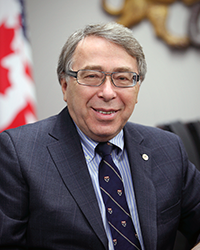 ROMAN Gr. MAEV
ROMAN Gr. MAEV
University of Windsor, Canada
Dr. Roman Gr. Maev, Distinguished University Professor of the University of Windsor, Ontario and founding Director-General of The Institute for Diagnostic Imaging Research, Canada - a multidisciplinary, collaborative research institute.
The diverse range of disciplines encompassed by Dr. Maev includes theoretical physical acoustics, ultrasonic and nonlinear acoustical imaging, biomedical ultrasound,nano structural properties of advanced materials and its analysis. He has published over 600 peer reviewed items and holds 44 international patents.
Dr. Maev is a Life Fellow of IEEE, and a Fellow of ASNT, BINDT, CINDE, and RSNTTD. He was the recipient of various Fellowships and Awards, including the Roy Sharpe Award, UK, and the ASNT Mentoring Award, USA. He has Chaired numerous US, Canadian and International Symposia and Conferences, also Dr. Maev is a Distinguished Lecturer of IEEE and has presented a number of Keynote and Invited lectures worldwide.
Dr. Maevis theICNDT International Specialist Groups (ISG) Chair “NDT Frontiers”
*********************
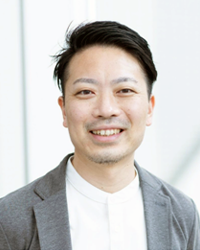 Shingo Maeda
Shingo Maeda
Tokyo Institute of Technology,Japan
Shingo Maeda is a full professor of department of mechanical engineering at Tokyo Institute of Technology in Japan. He leads soft materials and robotics lab. He studied applied physics at Waseda University(Ph.D. 2008) in Japan. In2011, he joined Shibaura Institute of Technology in Japanand led SmartMaterialsLab. In 2015, he was a visiting professor at The Bio Robotics Institute, ScuolaSuperiore Sant’Anna in Italy. In 2016, he was a visiting professor at Soft Transducers Laboratory (EPFL-LMTS) in Switzerland. Heis interested in softintelligent machines based on smart gels, elastomers, and functional fluids.He is currently a member of the International Research Frontiers Initiative (IRFI) at Tokyo Institute of Technology.
*********************
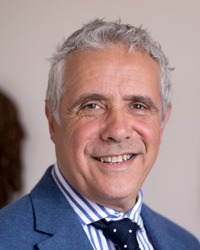 Professor Francesco Dazzi, MD PhD
Professor Francesco Dazzi, MD PhD
Medical Director of Cell Therapy
BioPharmaceuticals R&D, AstraZeneca
Francesco Dazzi is Medical Lead of Cell Therapy BioPharmaceuticals R&D and oversees the development of cell therapy projects from discovery to their delivery in the clinical setting.
Francesco is an academic clinician, specialised in haemopoietic stem cell transplantation, who has been working in the field of cell therapies for the last 25 years. He has produced a critical impact on the use of immunotherapy to treat leukaemia with donor lymphocyte infusions (DLI) and developed regimens that have been adopted internationally. He has also discovered mesenchymal stromal cells (MSC) as immunosuppressive mediators and characterized the underlying mechanism of action. He has developed a UK-based clinical programme for the use of MSC to treat GvHD. The clinical experience supported by the research laboratory have led to the identification of a highly sensitive biomarker to predict clinical responses to MSC (patent GB1718320.3). He has published more than 170 papers in high profile journals with a H-index of 68.
His experience ranges from basic research to cell manufacturing and clinical trials.
Prior to joining AstraZeneca in July 2022, Francesco was professor of Regenerative Medicine and Consultant Haematologist at King’s College London where he was Head of Cell Therapies and Vice-Dean for International Affairs. He retains an Adjunct Professorship in the School of Cardiovascular and Metabolic Medicine at King’s. Before then, he was Professor of Stem Cell Biology and Consultant Haematologist at Imperial College London. He obtained his MD and PhD in Italy and finalized his medical training at the Hammersmisth Hospital.
*********************
Treena Livingston,Columbia University, New York,